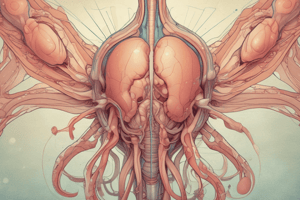Podcast
Questions and Answers
What are the male and female sex cells called in sexual reproduction?
What are the male and female sex cells called in sexual reproduction?
- Zygotes
- Embryos
- Gametes (correct)
- Sperms and ova
What is the primary method of reproduction in animals?
What is the primary method of reproduction in animals?
- Asexual reproduction
- Sexual reproduction (correct)
- Binary fission
- Budding
What is the result of the union of sperm and egg during fertilization?
What is the result of the union of sperm and egg during fertilization?
- Pupa
- Embryo
- Zygote (correct)
- Larva
Where does internal fertilization take place in animals?
Where does internal fertilization take place in animals?
In external fertilization, where does fertilization occur?
In external fertilization, where does fertilization occur?
What is a zygote?
What is a zygote?
What is a key difference between sexual and asexual reproduction?
What is a key difference between sexual and asexual reproduction?
How do male mammals and male insects differ in terms of sperm production and delivery?
How do male mammals and male insects differ in terms of sperm production and delivery?
What is the role of ovaries in female mammals during sexual reproduction?
What is the role of ovaries in female mammals during sexual reproduction?
Why is sexual reproduction important for the survival of species?
Why is sexual reproduction important for the survival of species?
In which organisms is asexual reproduction more common according to the text?
In which organisms is asexual reproduction more common according to the text?
What are some of the mating strategies exhibited by insects during reproduction?
What are some of the mating strategies exhibited by insects during reproduction?
Flashcards are hidden until you start studying
Study Notes
Reproduction in Animals: Exploring Sexual Reproduction
Life on our planet thrives through the process of reproduction, allowing species to survive and evolve over time. One of the primary methods of reproduction in animals is sexual reproduction, a complex and fascinating process that involves the fusion of gametes (sperm and egg) from two individuals.
The Basics of Sexual Reproduction
Sexual reproduction requires the presence of male and female sex cells called gametes. These gametes contain half the genetic information of the parent organisms, a fundamental aspect of genetic variation essential for evolution. The union of sperm and egg during fertilization results in the formation of a zygote, a single cell that contains the complete genetic makeup of the offspring.
Fertilization Process
The fertilization process can occur internally (within the female reproductive tract) or externally (in the external environment). In internal fertilization, sperm are deposited within the female reproductive tract, and the sperm race to reach the egg, which is typically housed in one of the reproductive organs, such as the ovary in mammals or the ovipositor in insects. In external fertilization, eggs and sperm are released into the environment, and fertilization occurs there.
Reproductive Systems in Mammals
Mammals exhibit a range of reproductive strategies that favor sexual reproduction. Female mammals have a two-chambered uterus and ovaries that produce eggs, or ova, which are released during a specific time of the month, called ovulation. Male mammals produce sperm continuously and deposit them within the female's reproductive tract, where they swim to reach and fertilize the egg.
Reproductive Systems in Insects
Insects use external fertilization, and the female typically releases her eggs into water or damp environments. Male insects produce sperm in sacs called ejaculatory ducts, and the sperm are released into the environment to swim towards the eggs. Insects also exhibit a variety of mating strategies, such as courtship and sperm competition.
Key Differences between Sexual and Asexual Reproduction
Sexual reproduction differs from asexual reproduction in several ways. During sexual reproduction, two parents are involved, and their genetic information is combined to form new offspring. This process results in the production of genetically diverse offspring and allows for the natural selection of favorable traits. In contrast, asexual reproduction involves a single parent, producing genetically identical offspring. Asexual reproduction is more common in simple organisms, while sexual reproduction is more prevalent in complex organisms, such as animals.
Conclusion
Sexual reproduction in animals is a fascinating process that results in the production of genetically diverse offspring. This process is essential for the survival of species and their ability to adapt to changing environments. The unique reproductive strategies employed by different animal groups contribute to the richness and complexity of our planet's biodiversity. Understanding the mechanisms of sexual reproduction and the diverse strategies employed by animals is essential for us to appreciate the complexity of life on Earth and the scientific discoveries that continue to illuminate the secrets of this process.
Studying That Suits You
Use AI to generate personalized quizzes and flashcards to suit your learning preferences.




